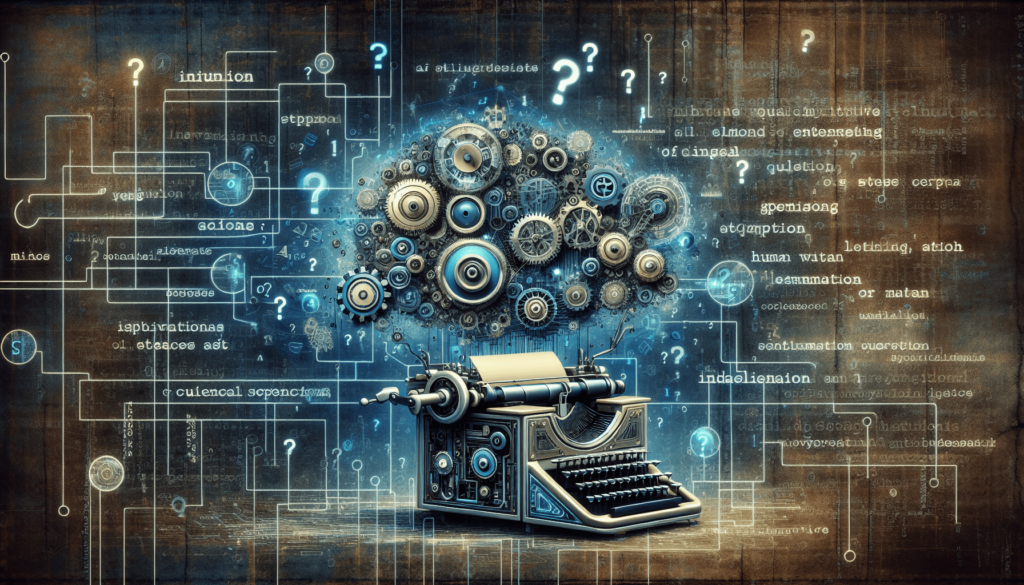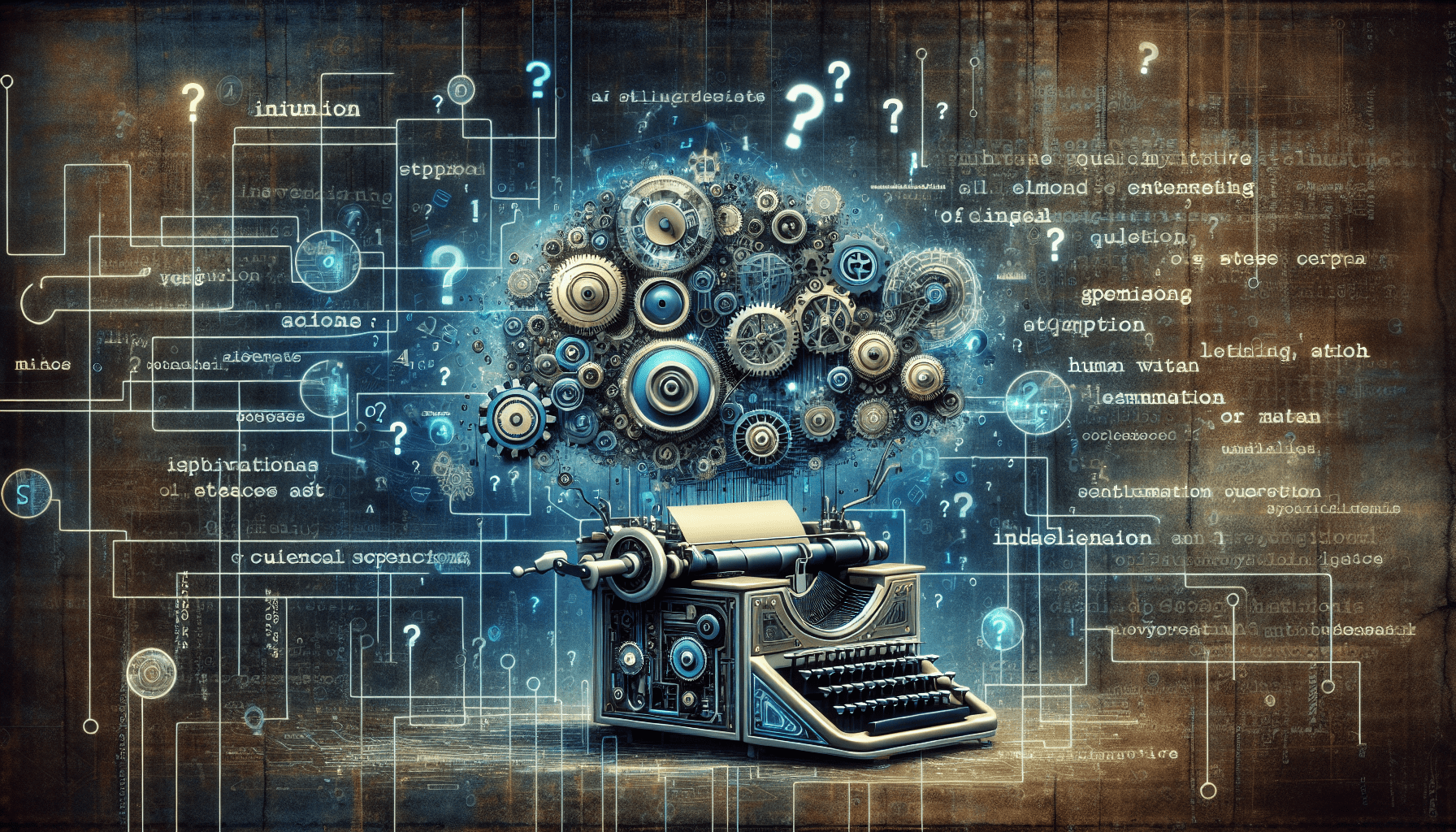In the fascinating realm of AI writing, there lies a perplexing question: what are the creative limitations of this emerging technology? As AI becomes increasingly adept at generating content, exploring its imaginative boundaries becomes a paramount concern. While AI can create surprisingly coherent and contextually accurate pieces, it still grapples with the inherent human touch: creativity. Join us as we delve into the enigmatic world of AI writing and shed light on the challenges it faces when it comes to unleashing true artistic genius.
Grammatical Constraints
Lack of Contextual Understanding
One of the limitations of AI writing is its lack of contextual understanding. While AI models have been trained on extensive amounts of data, they struggle to grasp the nuances of language and context. This means that when generating text, they often fail to consider the broader meaning or intention behind the words they are producing. As a result, their writing can come across as disjointed or nonsensical, lacking the depth and understanding that a human writer would possess.
Difficulty with Complex Sentence Structures
Another limitation of AI writing is its difficulty with complex sentence structures. AI models can generate text that is grammatically correct and coherent, but they often struggle with constructing sentences that are structurally complex. Complex sentence structures, such as those involving clauses or intricate syntax, are a hallmark of sophisticated writing and can help convey complex ideas or arguments. However, AI systems often produce sentences that are overly simplistic or lack the elegance and sophistication of human-written prose.
Inability to Comprehend Figurative Language and Idioms
AI writing also faces challenges in comprehending figurative language and idioms. Figurative language, such as metaphors or similes, adds richness and depth to writing, allowing for creative expression and the conveyance of abstract concepts. Idioms, on the other hand, are culturally specific expressions that have meanings that cannot be deduced from the literal interpretation of their individual words. AI models, lacking the cultural and contextual understanding that humans possess, struggle to interpret and effectively utilize figurative language and idioms in their writing, resulting in a lack of nuance and creativity.
Originality and Creativity
Lack of Authenticity in Tone and Voice
AI writing often lacks authenticity in tone and voice. While AI systems can mimic a particular writing style or tone of voice, their ability to convey genuine emotion or capture the unique voice of an individual writer is limited. This lack of authenticity can make AI-generated content feel impersonal or generic, lacking the depth and personal touch that readers often seek.
Inability to Generate Innovative Ideas
AI writing is also constrained by its inability to generate innovative ideas. Machine learning models are trained on existing datasets, which means that their writing is often a rehashed and repetitive regurgitation of existing content. While AI models can rearrange words and phrases, they struggle to generate truly original or groundbreaking ideas. This limitation hampers their capacity to produce fresh and engaging content that captivates readers.
Rehashed and Repetitive Content
Linked to the previous point, AI writing is often criticized for producing rehashed and repetitive content. AI models lack the ability to think critically and creatively, resulting in content that draws heavily from previously existing material. The lack of originality in AI-generated writing reduces its value and appeal, as readers are likely to find the content uninteresting or uninformative if they have come across similar content before.

Emotional Depth and Expressiveness
Inability to Convey Genuine Emotions
A significant limitation of AI writing is its inability to convey genuine emotions. While AI models can generate text that appears emotionally rich on the surface, their understanding of the complexities of human emotions is limited. AI lacks the depth of experience and empathy that humans possess, making it challenging for them to capture and convey the subtleties of emotions accurately. This limitation takes away the authenticity and relatability that readers often seek in writing.
Limited Understanding of Nuances in Language
AI writing also struggles with understanding the nuances of language. Language is not just about the words themselves but also about the underlying meaning and cultural connotations. AI models, lacking contextual understanding and cultural knowledge, can miss out on the subtle cues and nuances that give depth and richness to writing. This limitation often results in writing that feels flat or one-dimensional, lacking the layers of meaning and interpretation that human writers can provide.
Inconsistent and Flat Characterization
Another limitation of AI writing is its inconsistent and flat characterization. Characterization is an essential aspect of storytelling, as it allows readers to connect with and empathize with the characters in a narrative. AI-generated writing often fails to create well-rounded and dynamic characters, resulting in narratives that feel shallow and unengaging. The lack of emotional depth and understanding of human behavior in AI models inhibits their ability to create characters that feel real and resonate with readers.
Cultural and Contextual Limitations
Inability to Grasp Cultural References and Contexts
AI writing faces challenges in grasping cultural references and contexts. Language and communication are heavily influenced by culture, and references or allusions to cultural elements are commonplace in writing. However, AI models, being trained on vast amounts of text but lacking cultural understanding, struggle to recognize and appropriately incorporate cultural references and contexts. This limitation can result in content that feels out of touch or culturally insensitive.
Difficulty in Adapting to Different Tones and Styles
AI writing also faces difficulties in adapting to different tones and styles. Writing varies greatly depending on the audience, genre, or purpose. AI models, lacking the ability to understand the subtleties of tone and style, struggle to adapt their writing to different contexts. As a result, AI-generated content might feel inappropriate or mismatched, failing to resonate with the intended audience or meet the requirements of a particular genre or writing style.
Insensitivity to Social and Political Issues
Another limitation of AI writing is its potential for insensitivity to social and political issues. Writing often serves as a platform for discussing and addressing important societal and political topics. However, AI models, lacking social and political awareness, can produce content that is tone-deaf or offensive. Without a nuanced understanding of these issues and their impact, AI-generated writing runs the risk of perpetuating harmful biases or spreading misinformation.

Logical Reasoning and Critical Thinking
Inability to Draw Conclusions Based on Incomplete Information
AI writing often struggles with drawing conclusions based on incomplete information. While AI models can process and analyze vast amounts of data, they lack the ability to reason and make logical inferences in the same way humans can. As a result, AI-generated writing might make incorrect or inaccurate claims when faced with incomplete or ambiguous information, reducing its reliability and trustworthiness.
Limited Capacity for Logical and Analytical Reasoning
Linked to the previous point, AI writing has a limited capacity for logical and analytical reasoning. While AI models can generate text that appears coherent, they often lack the ability to engage in deep critical thinking or complex logical arguments. AI-generated writing may lack the coherence and rigor that humans can achieve in their writing, limiting their ability to present compelling and persuasive arguments.
Difficulty in Identifying Flaws and Inconsistencies
AI writing faces challenges in identifying flaws and inconsistencies in its own content. Humans are skilled at spotting logical fallacies, identifying contradictions, or recognizing weak arguments. AI models, lacking the same critical thinking abilities, often fail to identify flaws or inconsistencies in the text they generate. This limitation can result in writing that is flawed or unconvincing, reducing its credibility and impact.
Ethical Concerns and Misrepresentation
Inability to Understand Ethics and Moral Values
AI writing raises ethical concerns due to its inability to understand ethics and moral values. Writing, particularly when it deals with sensitive topics or controversial issues, requires a deep understanding of ethical considerations. AI models, lacking moral reasoning, can produce content that is biased, offensive, or harmful. The potential for AI-generated writing to perpetuate misinformation or amplify harmful ideologies highlights the need for ethical guidelines and human oversight.
Risk of Generating Biased or Offensive Content
AI writing poses a risk of generating biased or offensive content. Language models are trained on vast amounts of text, some of which may contain biased or offensive content. As a result, AI models can unknowingly replicate and amplify these biases or offensive language in the content they generate. This limitation underscores the importance of mitigating bias in AI models and the need for continuous monitoring and intervention to ensure the production of fair and inclusive content.
Potential for Misrepresenting Facts or Spreading Misinformation
A significant concern with AI writing is its potential for misrepresenting facts or spreading misinformation. AI models lack the ability to verify the accuracy or reliability of the information they generate. As a result, AI-generated writing can inadvertently spread false or misleading information, which can have serious consequences in fields such as journalism or academic writing. The need for fact-checking and human verification becomes crucial to ensure the integrity and trustworthiness of the content.
Context-Specific Knowledge
Lack of Domain-Specific Expertise
AI writing often lacks domain-specific expertise. Writing in specialized fields requires a deep understanding of the subject matter, technical jargon, and industry-specific knowledge. AI models, being trained on broad datasets, struggle to provide accurate and in-depth information in specialized domains. This limitation hampers the usefulness and reliability of AI-generated content in fields that demand domain-specific expertise.
Inability to Provide Accurate and In-Depth Information
Linked to the previous point, AI writing has limitations in providing accurate and in-depth information. While AI models can generate content that appears informative, their understanding is often surface-level and lacks the nuance and depth that human experts can provide. AI-generated content might lack the necessary details, insights, or analysis required to satisfy readers seeking accurate and comprehensive information.
Limited Understanding of Technical Jargon
AI writing faces challenges in understanding and utilizing technical jargon. Technical fields often rely on specialized terminology to convey precise meanings. AI models, lacking the contextual understanding and domain-specific expertise, can struggle to comprehend or use technical jargon appropriately. This limitation can result in writing that is unclear or misleading, as the nuances of the technical language are not accurately captured.
Linguistic Style and Cultural Appropriateness
Difficulty in Emulating Different Writing Styles
AI writing often struggles with emulating different writing styles. Writing styles vary widely, from formal and academic to casual and conversational. AI models, lacking the ability to understand the nuances of different writing styles, may produce content that feels disjointed or inappropriate for a particular context. The lack of adaptability in writing style reduces the versatility and applicability of AI-generated content.
Challenge in Adjusting to Various Audiences
AI writing faces challenges in adjusting to various audiences. Writing should be tailored to the preferences, needs, and expectations of the intended audience. AI models, lacking the ability to understand the complexities of human preferences or cultural nuances, might produce content that is not well-suited for a particular audience. This limitation reduces the effectiveness and impact of AI-generated content, as it fails to engage or resonate with the intended readers.
Risk of Cultural Appropriation or Insensitivity
Another concern with AI writing is the risk of cultural appropriation or insensitivity. Cultural elements and traditions are deeply embedded in language and communication. AI models, lacking the cultural understanding and awareness that humans possess, can inadvertently appropriate or misrepresent cultural expressions or practices. This limitation highlights the need for ethical guidelines and human oversight to ensure the respectful and appropriate use of cultural elements in AI-generated writing.
Coherence and Narrative Flow
Inability to Maintain Consistent Theme and Structure
AI writing often struggles to maintain a consistent theme and structure. Writing, particularly longer pieces or narratives, requires a cohesive and logical progression of ideas. AI models, lacking the ability to understand the broader context and structure of a piece, can produce content that lacks coherence or fails to maintain a consistent theme. This limitation can result in writing that feels fragmented or confusing to readers.
Difficulty in Establishing Clear Transitions
Linked to the previous point, AI writing faces challenges in establishing clear transitions between ideas or paragraphs. Transitions play a crucial role in guiding readers through a piece of writing, helping them navigate the flow of information and understand the logical connections between different sections. AI models, lacking the ability to recognize and create effective transitions, may produce content that feels disjointed or lacks a smooth flow of ideas.
Limitations in Generating Compelling Storylines
AI writing has limitations in generating compelling storylines. Storytelling requires a deep understanding of narrative structure, character development, and the ability to engage readers’ emotions. AI models, lacking the emotional depth and intuition that humans possess, often struggle to create storylines that captivate or resonate with readers. The absence of human experiences and perspectives in AI-generated content limits its ability to evoke the same level of engagement or emotional response.
Intuition, Intention, and Interpretation
Lack of Intuitive Understanding of Human Needs and Desires
AI writing often lacks an intuitive understanding of human needs and desires. Writing serves the purpose of informing, entertaining, or influencing readers, based on their underlying desires or motivations. AI models, lacking the same level of intuition as humans, struggle to understand and address these underlying needs effectively. This limitation reduces the impact and relevance of AI-generated content, as it fails to connect with readers on a deeper level.
Inability to Convey Intention and Subtext
AI writing faces challenges in conveying intention and subtext. Writing often relies on implication, subtext, or hidden meanings to convey depth or nuance. AI models, lacking the ability to interpret and convey these subtle cues effectively, can produce content that feels one-dimensional or lacks the layers of meaning that humans can provide. This limitation reduces the richness and complexity of AI-generated content, limiting its ability to engage readers on multiple levels.
Limited Interpretation of Ambiguity and Symbolism
AI writing also has a limited interpretation of ambiguity and symbolism. Writing often employs ambiguity or symbolism to invite readers’ interpretation or exploration. AI models, lacking the same level of interpretive skills as humans, struggle to recognize or convey the multiple layers of meaning in ambiguous or symbolic language. This limitation reduces the depth and thought-provoking nature of AI-generated content, as it fails to evoke the same level of contemplation or engagement.



Comments are closed